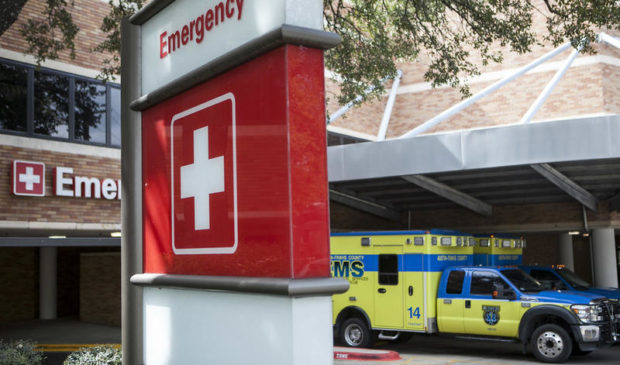State lawmakers approve legislation shielding most Texans from surprise medical bills
Wednesday, May 22, 2019 by
Ashley Lopez, KUT Surprise medical bills may be a thing of the past for many Texans. In a unanimous vote, the Texas House approved a Senate bill banning health care providers from sending steep medical bills to insured Texans in emergencies.
Senate Bill 1264 passed the Texas House on a 146-0 vote. If signed into law, it would remove patients from the middle of disputes between health insurance companies and hospitals or other medical providers. This doesn’t apply to Texans with federally regulated plans, which account for roughly 40 percent of the state’s health insurance market.
Surprise medical billing typically happens when someone with health insurance goes to an out-of-network hospital during an emergency. It can also happen if that patient goes to an in-network hospital and their doctors or medical providers are not in-network. Sometimes insurance companies and medical providers won’t agree on what’s a fair price for that care and patients end up with a hefty medical bill.
SB 1264 prohibits those bills from being sent to patients in the first place. Instead, the law would allow providers and insurers to enter into arbitration to negotiate a payment. The legislation also creates state regulatory authority over the arbitration process.
“Texas patients have been stuck in the middle of payment disputes between insurance companies and medical providers for way too long,” said the bill’s author, Sen. Kelly Hancock (R-North Richland Hills). “Enough is enough. After a decade of fighting alongside consumers on this issue, I couldn’t be more proud and appreciative of my colleagues for coming together in a bipartisan, bicameral groundswell to do right by Texans and get this landmark legislation passed.”
Hancock says a key part of the legislation prohibits surprise billing in situations where patients “have no choice which provider they see or which facility they visit,” which includes out-of-network care at in-network hospitals, and out-of-network lab and imaging work.
Consumer advocates have been urging lawmakers to do more to help Texans saddled with surprise medical bills. For the past decade, Texans have had the option of turning to a little-known mediation program in the Texas Department of Insurance.
The program, historically, had many loopholes and few consumers qualified for help. After it was expanded during the 2017 legislative session, thousands more patients filed complaints the following year.
For example, the department was asked to mediate just 686 medical bills in 2014. During the 2018 fiscal year, the agency received 4,445 bills.
Stacey Pogue, a senior policy analyst with the Center for Public Policy Priorities, told KUT earlier this year that the current mediation process was working pretty well when patients actually turned to it, but not enough people have known about the option.
“The instructions for how to do it are on … the most indecipherable documents you are going to get,” she said, adding that even when people understand they have a right to mediation, they often get scared off by the concept and assume they need a lawyer.
The bill takes the burden off the patient altogether.
State Rep. Trey Martinez Fischer (D- San Antonio), who carried the bill in the House, said in a statement that the bill also ensures that both insurers and providers are complying with these new rules.
“SB 1264 also adds two new enforcement mechanisms: administrative penalties by the relevant state agencies and the ability for the AG’s office to seek an injunction against perennial bad actors,” Martinez Fischer said.
Martinez Fischer said surprise medical billing has been a longtime “industry issue” in which health plans and providers have been “fighting over their respective business interests” for years.
“It is a consumer issue,” he said. “In Texas, we are setting an example for the nation in saying clearly and boldly that sending a surprise medical bill will no longer be tolerated. Period.”
But these protections won’t apply to every insured Texan. SB 1264 only applies to state-regulated insurance plans.
U.S. Rep. Lloyd Doggett, a Democrat from Austin, has been working on a solution for federal plans. He recently said he’s encouraged that Texas lawmakers have worked to solve the problem of surprise medical bills, but he called federal protections “essential.”
“For patients, you can take all the right steps in attempting to see that your care in-network is covered, but you still might face some really big bills,” Doggett said at a subcommittee meeting Tuesday.
Changes to the bill still need to be approved by the Senate before it heads to Gov. Greg Abbott’s desk for final approval.
This story was produced as part of the Austin Monitor’s reporting partnership with KUT. Photo by Spencer Selvidge/KUT.
The Austin Monitor’s work is made possible by donations from the community. Though our reporting covers donors from time to time, we are careful to keep business and editorial efforts separate while maintaining transparency. A complete list of donors is available here, and our code of ethics is explained here.
You're a community leader
And we’re honored you look to us for serious, in-depth news. You know a strong community needs local and dedicated watchdog reporting. We’re here for you and that won’t change. Now will you take the powerful next step and support our nonprofit news organization?










